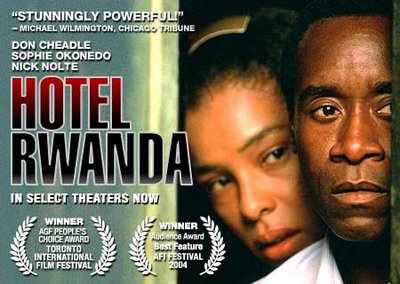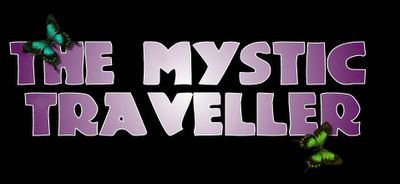Review: Hotel Rwanda
 From April to July in 1994, human beings managed to once again tap into their base nature and bring about horrors that had not been seen since the barbaric atrocities of Pol Pot in Cambodia.
From April to July in 1994, human beings managed to once again tap into their base nature and bring about horrors that had not been seen since the barbaric atrocities of Pol Pot in Cambodia.During this horrendous chapter, the world sat back and allowed the killing to continue, mainly out of fear of being embroiled in a regional conflict that had no importance to their own national security: If there had been oil and other resources, perhaps, the story may have been different. The situation is chillingly similar to the current crisis in Darfur, Sudan.
Hotel Rwanda is an exceptional movie that truly captures the increasing pressures and horrors that a sudden conflict can bring upon a society.
Based on a true story, the film focuses upon a hotel manager, Paul Rusesabagina, played by the brilliant Don Cheadle. His life, prior to the war, is one that is preoccupied by pleasing people. He offers bribes of fine whiskey and Cuban cigars to high officials, in the hope of securing a good future for his family. His life is rapidly altered by the events that swamp his country.
The film is extraordinary in the way it summarises the reasons for the carnage in Rwanda. The Hutus, who represent 88% of the population, and the Tutsi, who represent 11%, had a long history of antagonism towards each other. Much of this was based on tribal distinctions established by Belgian colonisation. In 1994, within a three month period, around 1 million people were slaughtered.
Hotel Rwanda is very similar in direction and production to The Killing Fields. The audience is taken on a terrifying journey where society breaks down rapidly, and where the illogical is allowed to rule. Enemies of the aggressors are labelled as 'cockroaches' and exterminated as such, with machetes and knives.
The director, Terry George, who also co-wrote the screenplay, brilliantly invokes the violence and fear to such a point that all governments and people should feel shame for what had been allowed to occur. Too easily, Rwanda was marginalised at convenience for some world leaders. Hotel Rwanda clearly aims to neutralise any efforts to make the Rwandan genocide forgotten.
Throughout the film, there are many gruelling scenes of violence and death. In one particular section, Paul Rusesabagina is trying to return back to his hotel, with much needed supplies, following a road recommended to him by a Hutu marketeer. The vehicle is travelling through dense fog, when suddenly it hits a very uneven, bumpy part of the road. Paul steps outside and discovers a road dense in human carnage.
Don Cheadle's performance is mesmerising. His portrayal of Paul Resesabagina shows a man dedicated to humanity and order, who will try under the most difficult circumstances to retain those qualities at all cost. We are given a template of a very real, non-glamourised hero, who will do whatever it takes to save his family and friends.
Other fine performances come from Joaquin Phoenix as an American reporter, and Nick Nolte as a fictionalised UN colonel, based on the Canadian Lieutenant General, Romeo Dalliare. The bitterness and insanity of the situation is masterfully encapsulated by Nolte. He is a desperate man with exceptionally good intentions, let down by a world that doesn't care.
Hotel Rwanda is a film that instantly sucks the viewer into a reality that we all hope never to experience. This film has a message that must be heard by all.



7 comments:
Interesting. I must check this movie out some time. The politics surrounding the events the movie refers to, are admittedly not something I know much about beyond the basics. Although I agree there is a lot of truth in suggesting western powers often hold back going into some areas because there is not sufficient 'return' on their investment, I also feel that rich western nations often face a scenario of - "Damned if we do, damned if we don't". For every local that welcomes intervention, there is another who creates a rebel war against the 'invader'. For every citizen of a powerful nation that welcomes intervention, there is another who labels it 'being arrogant police of the world'. Western nations often face the old Kobayashi Maru situation (and unlike Kirk, we can't cheat somehow to win). Somalia 1992-1994 is an example that is a scar on Americas memory. Western politicians realize that African politics are some of the most corrupt in the world, and the tribal ferocity is some of the most viscious in the world. I'm not sure if there is any easy solution.
I was, and am, extremely against the invasion of Iraq. I went on many peace marches in protest of the war. The reason for this position was mainly because of the insane politics and shoddy evidence that was clearly going to lead to a more unstable world as a result.
Saddam was a monster, but I believe that the Iraqis did have a semblance of life, which they do not have now. In my opinion, I expect Iraq to fragment into three new states, defined by ethnicity.
As much as I would love the world to mature pass playground bullying and fighting, I am a realist who can see that conflict is sometimes necessary. Certainly, World War II was such a cause. While there are contrasting ideologies, there will always be war.
I also believe that in certain circumstances, such as with Rwanda and Sudan, it is necessary at whatever cost, to stop such horrendous carnage. These insane conflicts debase the collective human spirit. Turning a blind eye only further rots the moral core of human society.
In such circumstances, it is vital that there be a strong United Nations. Most certainly, the UN needs to be restructured so that it is not just a body for the benefit of the 5 permanent security council members.
There has to be a unified,multilateral world effort to stop unnecessary conflicts. History does not need another Rwanda or Cambodia. A lot more can be done.
"There has to be a unified,multilateral world effort to stop unnecessary conflicts".
It is a nice idea. But whether or not that is possible, is uncertain. As you say - "As long as we have contrasting ideologys...". That is the root of things (IMO) and why I'm not sure the world could ever unify in a way that it would tackle problems together. Governments on such a council will always be supporting political and cultural meddling, occupation of lands, and economic dealings that other members of the council are bitterly against. Each ideology in the world thinks 'it' is right, and that the other is totally deluded.
Whole ideologys feel some conflicts are fully justified and are not questionable in any way. Islam, in particular (and not just the loonys) fully sanctions war in the same form that we say our war with Germany in WWII was fully justified and nescessary. We all think in a rather similiar way, it seems. It just 'appears' that we are miles apart.
Neoconservatives and the background Project for the New American Century, are convinced that "onward soldiers of freedom with the sword of democracy...erm, as long as we agree with who you elect" is the way forward, even if that means invading the entire Islamic world and ousting all its governments. Haha, what a wonderful world :D :/
Btw, I agree with you about Iraq. Iraq will prove to be the most costly screw up in American (and British) history (IMO). It was an almighty scam.
I absolutely agree with many of your sentiments. Yes, indeed, there are positions that have conflict as a central tenant in their ideology. As I said previously, I am a realist, and sadly acknowledge that there can never be world peace, while there are differences in ideology.
I also would not like to live in a world where one ideology dominates; in itself an implausible situation, since ideologies within ideologies exist. Take for example the variations and interpretations of Christianity.
Certain ideas can be very dangerous, but this depends upon perspective. I am sure that the Neo-Conservatives, as much as I loathe them, have their people's best interest at heart.
Radicalism and revolutionary stance, while troubling initially to a society, does sometimes have worth, and I would hate to appear as someone who is opposed to such changes. Again, it all depends on the perspective of an ideology.
For example, I would love there to be a radical shift away from the consumerist values that dominate our world right now, which exploit the environment and keep the poor poor, but I am aware that there are many who would be highly protective of this current status quo.
As radical as the Neo-Cons are, they are in fact trying desperately to retain the US's status quo and position in the world for the 21st Century. Unfortunately, they have miscalculated their strategy, and it is having the opposite effect intended.
Like the failed aspirations of the Neo-Cons, the UN has also failed to achieve its noble aims. Having said that, I believe that it is important to continue to push the idealism it promotes, because without, the world would be a much darker place.
Interesting thoughts,El-Branden. All of them ring true. We are certainly living in the midst of a very complex conflict. Extremist and determined ideology on both sides,pathological denial of personal blame on both sides,hypocrisy on both sides,ignorance on both sides of what other cultures are 'really like,moderates on both sides deep down supporting extremist solutions in spirit due to ugly politics,and a plethora of historical,economic,and cultural roots leading up to what is happening now. Because of that, I often see reasoning on both sides for each of their stances. Both sides have legitimate concerns. Both have some legitimate and rational concerns which I find myself agreeing with. On other occasions, both have 'irrational' views too,which make them completely impossible to support 100%. Does that make me an Islamo-Con/Neo-Islamist? LOL Or just someone who has been cursed with feeling empathy for both sides, and as a result not being handed that easy option of just taking a 'side'.
Again, I agree entirely. Being a non-Christian/Muslim, who lives in Japan, I wish not to be embroiled in their dispute. I just want to be left alone.
Having said that, as a son of the West, I do feel protective about some aspects of the life that the West has provided for me. So, if push comes to shove, I would side with representatives of the West. BUT, it is just so damn hard to do so, while Bush, Blair and the Neo-Cons are in charge. I DON'T have anything in common with these men, in the same way I have nothing in common with Bin Laden and his ideology. I feel rather displaced by these circumstances.
100% understand your dillema.
Post a Comment